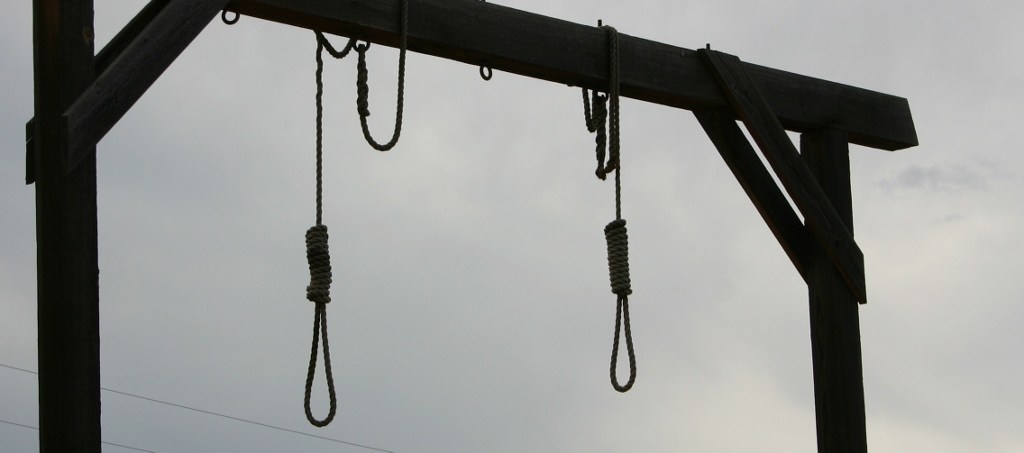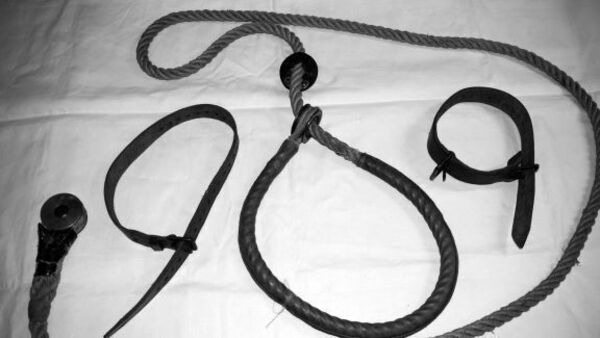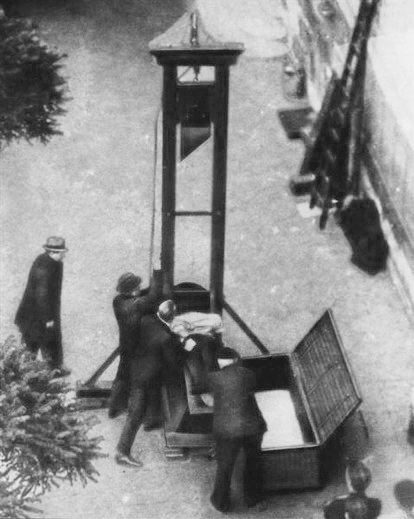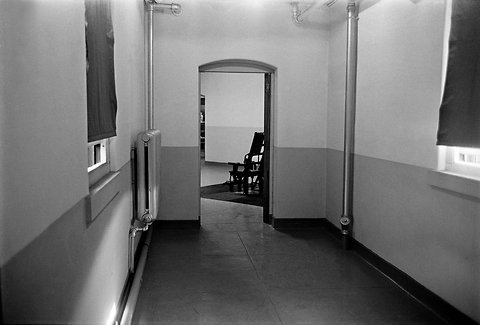English history is not short of noblemen who met their end at the hands of the public executioner. Minor nobles like Lord Lovat and Earl Ferrers. Queens Anne Boleyn and Catherine Howard. Even one King, Charles I, kept his date with the axe. Far rarer are noblemen who mounted the scaffold and left it alive and rarer still are ones who did the work of the public executioner. A rather dubious distinction, granted, but a distinction all the same.
Sir Claude Champion de Crespigny, Baronet of Champion Lodge, Camberwell, was one of them. The fourth Baronet in the de Crespigny line, Sir Claude was a gentleman adventurer, keen sportsman and possibly the only English nobleman to become an executioner. Granted, he only witnessed one execution and assisted at another, but he earned his footnote in the chronicles of crime nevertheless.
The hanging of murderer James Lee at Chelmsford in May of 1885 was a slightly troubled affair. Chief executioner James Berry had endured a traumatic experience at Exeter earlier that year when John Lee had become the legendary ‘Man they couldn’t hang.’ Originally named James Menson, Menson changed his name partly in jest. If they couldn’t hang John Lee, he said, they couldn’t hang him, either. For a violent professional crook, Menson had a sense of humour and perhaps a little superstition as well. He was also dead wrong, literally. He not only died on the hangman’s rope, but wore the same rope that had failed to kill his famous namesake.
Berry was troubled by something else as well, that he might he hanging an innocent man. Berry himself thought ‘Lee’ might have been wrongfully convicted, as did one of the prison warders guarding him. ‘Lee’ himself certainly proclaimed his innocence, and his violent streak. Lee threatened the judge in open court, so much so that he was surrounded by seven warders while hearing his death sentence. Whether guilty or innocent, James Lee was certainly a menace to society. As Berry himself later remarked, it was felt by some that society was better off with Lee safely in his grave, be he innocent or guilty.
A number of officials witnessed Lee’s execution, one being Sir Claude. A local Magistrate at the time, Sir Claude had ambitions to become High Sheriff of the County of Essex. Among the High Sheriff’s official duties was organising executions, a grim task they were increasingly leaving to their deputies, the Under-Sheriffs. Sir Claude, though, was made of sterner stuff. Never wanting to have someone else do a job he would not do himself, he wanted to become High Sheriff and take on even the grimmest aspects of the job.
Having witnessed Lee’s execution, he stopped hangman Berry and the pair made a strange deal. Next time Berry had a ‘job’ to do he would receive ten pounds, a considerable sum at the time, if Sir Claude could attend. This time he would not be watching, but assisting. It would not be long before Berry earned another fee and a Knight of the Realm would be on hand to help him do it. The occasion would be a particularly notable one.
It was at Carlisle that Sir Claude got his wish and Berry his extra ten pounds. James Lee had been hanged for the murder of Inspector Thomas Simmons of the Essex County Police. Another man, James Dredge, had earned twelve months hard labour for his part in the crime and a third, James Martin, had escaped. He had not escaped for long.
Convicted with Anthony Rudge and James Baker for murdering a Constable Joseph Byrnes near Netherby Hall in October, 1885, Martin was condemned to die with them in Berry’s first triple execution. A fourth criminal, James ‘One-armed Jimmy’ Smith escaped. Rudge, Baker and Martin would not be hanged one after another. They would be hanged on the same gallows at exactly the same time. Carlisle Jail’s first triple execution was about to begin.
Unsurprisingly, Berry needed an extra pair of hands for the job and Sir Claude (calling himself ‘Charles Maldon’ for the occasion) was happy to oblige. All three prisoners would need to have their arms securely strapped before being led to the gallows. Once positioned on the trapdoor they had to have their legs straps before being hooded and the nooses placed precisely round their necks. This was not a job for a novice, never mind a debutante, but Berry had made his agreement and the extra help was needed. Regardless of Sir Claude’s inexperience, Berry would run the show and ‘Charles Maldon’ had a walk-on part in it.
When the time came the trio died without undue fuss or bother. Berry pinioned Rudge and Martin while Sir Claude, to his credit, pinioned Baker without incident or mistakes. After being led to the gallows all three died quickly. Before dying Martin, assuming he was telling the truth, confirmed Berry’s fears about James Lee. According to Berry’s own memoir, Martin remarked:
“You hanged Lee at Chelmsford for shooting Inspector Simmons at Romford. He was innocent. That crime was committed by me.”
According to Berry himself, he talked this over with Sir Claude after the hangings. To quote Berry himself:
‘We talked about the confession afterwards, and at the time were both agreed that Martin was undoubtedly the man who shot police inspector, and on his own confession committed other murders for which innocent men had been hanged. The authorities knew that to own up would be to endanger their own position, and so they remain silent.’
With Lee, Baker, Rudge and Martin safely in their graves, Act One of the drama was over. Act Two, however, was only beginning. Public attitudes to capital punishment have often been inconsistent. Some favour it, some don’t and others vary their opinion from case to case. The press had a field day with a Knight of the Realm, in their opinion, anyway, lowering himself to become an executioner. He was variously and tastelessly parodied as ‘Baron Fitz-Throttle’ and ‘Lord Decrespiniony’ by satirists of the time.
To some, Sir Claude was a man of principle, not wanting to make anyone do what he would not do himself. To others, he was denigrating his noble birth and title. Public Executioner was supposed to be a lowly job for lowly people, performing dark deeds in low places. How could a titled aristocrat lower himself to emulate Jack Ketch or William Calcraft?
The fuss endured for some time. At that point Berry was free to employ anyone he wanted. There were few hard and fast rules, no standardised equipment or procedures and Berry himself had started to become an embarrassment. It was, officialdom thought, long past time for change. Strict regulation would be the order of the day and woe betide anyone defying it.
The Aberdare Committee was formed in 1886 to define the role of executioners, specify what equipment they could use, the kind of people who could be chosen and remove many of the grim if time-honoured perks of the hangman’s calling. The Committee’s findings would have stiff consequences for Berry’s successors. A new High Sheriff was in town, although Sir Claude would never become one.
After Berry’s resignation in 1892 the hangman’s remaining traditional perks were removed. No longer could they hold court in local taverns and saloons before an execution, talking publicly of criminals they had hanged and whoever they were about to. Berry had developed an undesirable and well-deserved reputation for doing so and it was considered an embarrassment. By then so was Berry himself. His relationship with his employers was becoming increasingly fractious.
Equipment such as ropes, hoods, pinioning straps and so on, would be provided by the authorities and could not be removed from a prison. No more would executioners design and use whatever they wanted for the job. They could still suggest improvements and test minor changes in the only way possible (hanging people to see if their new ideas worked), but using un-approved equipment became a sackable offence.
Executioners would have to be vetted and trained, with only those deemed suitable offered work. After Aberdare the High Sheriff of a County would select the hangman and the prison Governor would pick the assistant. The deliberately-nondescript ‘Official List’ provided the only names they could choose from, it became illegal for anyone not on that list to officiate at an execution thereafter. The slightest mistake or hesitation at an execution would result in instant dismissal.
No longer would hangmen be able to sell used ropes by the inch in pubs or to whoever wanted them. Nor could they keep a prisoner’s personal belongings and clothes to sell them as souvenirs. To prevent future hangmen carousing publicly as Berry and others had done, they had to arrive at a prison by 4pm the day before a hanging and stay inside the prison until permitted to leave.
Strict secrecy rules were later introduced to keep executions and executioners as discreet as possible. Reporters could still attend and did so up until the 1930’s, but hangmen were strictly prohibited from talking to anyone about their work or from doing anything that might attract undue attention on their way to or from an execution.
Eventually, executioners had to sign the Official Secrets Act making any disclosure punishable with fines and possibly imprisonment. The fate of any former hangman outed to their fellow convicts does not bear thinking about, but some did come close to imprisonment. Decades later, assistant executioner Syd Dernley lost his place on the list after drawing six months for selling obscene material. Fortunately for Dernley, his fellow convicts never saw the small article in the London Times listing his crime, sentence and part-time prison work.
Any misconduct, in public or private, could see them immediately removed from the list without even being told they had been, something Berry eventually fell foul of. His deciding to employ Sir Claude had already put him closer to being fired. The number of botched hangings during his career, his attention-seeking and his increasing dependence on alcohol eventually saw him quietly removed.
When Berry finally resigned in 1892 it was without knowing that the Prison Commissioners had already decided he was unfit for the job and should not be employed any more. By the time he officially left, Berry had already effectively been dismissed. The strict policy of summary dismissal for the slightest infraction continued until capital punishment for murder was abolished in 1969.





Leave a Reply